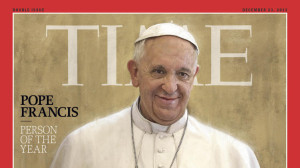 Time magazine has picked Pope Francis as its 2013 Person of the Year, with the popular pontiff beating President Barack Obama, Republican Sen. Ted Cruz among others for the top honor.
Time magazine has picked Pope Francis as its 2013 Person of the Year, with the popular pontiff beating President Barack Obama, Republican Sen. Ted Cruz among others for the top honor.
In order to qualify for the coveted title, a person must have the ability to reach and influence the masses. For better or worse.
“Rarely has a new player on the world stage captured so much attention so quickly,” said Time Managing Editor Nancy Gibbs Wednesday. “In his nine months in office, he has placed himself at the very center of the central conversations of our time: about wealth and poverty, fairness and justice, transparency, modernity, globalization, the role of women, the nature of marriage, the temptations of power.”
Gibbs pointed out that the 76-year-old Pope has “no army or weapons, no kingdom beyond a tight fist of land in the middle of Rome, but with the immense wealth and weight of history behind, to throw down a challenge.”
The Pope’s message is also spreading to people beyond the church, said Gibbs.
“When he kisses the face of a disfigured man or washes the feet of a Muslim woman, the image resonates far beyond the boundaries of the Catholic Church,” Gibbs wrote in a piece explaining the magazine’s selection.
The former Jorge Bergoglio was selected from a short list of candidates including Syrian President Bashar Assad, Amazon founder and Washington Post owner Jeff Bezos, Iranian President Hassan Rouhani, National Security Agency leaker Edward Snowden, Obama, Cruz, gay rights activist Edith Windsor, Health and Human Services Secretary Kathleen Sebelius, and entertainer Miley Cyrus, all of whom, for better or worse, made top headlines in 2013. Snowden, Windsor, Assad, and Cruz were named as runners-up by “Time.”
Former Vice President Dick Cheney earlier this week described the shortlist as “crappy,” especially taking offense at Snowden, who he calls a traitor who should be “tried for treason.”
But Francis was chosen over all the others, for many reasons, noted Gibbs, including his powerful message of “don’t just preach; listen. Don’t scold; heal.”
The church has been weakened worldwide by scandals and corruption, said Gibbs, and in less than a year, “he has not changed the words, but he’s changed the music. Tone and temperament matter in a church built on the substance of symbols — bread and wine, body and blood — so it is a mistake to dismiss any Pope’s symbolic choices as gestures empty of the force of law.”
Further, Gibbs said Francis is a humble man with a sense of timing who lives in a hostel instead of the papal palace.
“He prays all the time, even while waiting for the dentist,” said Gibbs. “He has retired the papal Mercedes in favor of a scuffed-up Ford Focus. No red shoes, no gilded cross, just an iron one around his neck.”
Further, she said, Pope Francis is doing more than “modeling mercy and transparency” when he rejects privilege, calls strangers, and releases Vatican financial information for the first time.
“He is embracing complexity and acknowledging the risk that a church obsessed with its own rights and righteousness could inflict more wounds than it heals,” said Gibbs.
Gibbs said Francis has become “something of a rock star.”
More than 3 million people showed up to see him on Copacabana Beach in Rio de Janeiro last summer, said Gibbs, and “churches report a “Francis effect” of lapsed Catholics returning to Mass and confession.”




